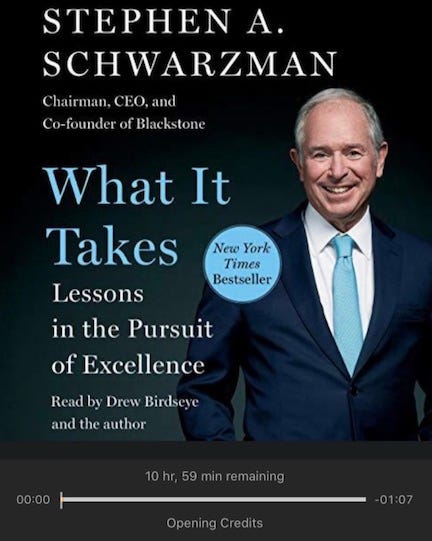What It Takes by Stephen Schwarzman

In the past, I worked at Ann’s Italian Restaurant back in Hales Corners, Wisconsin (a Milwaukee suburb). My first job, I worked there for 2 years before college and then summer and winter breaks until after my junior year at the university. Justin was the general manager there (and still is) and we often talked about business, finances, cars, and investments. One of his favorite stocks was Blackstone. I invested in them myself and we both were able to collect a dividend. Once I saw that this was one of the suggested books on Audible, I thought that I could learn a lot from the gentleman who constructed and has led an incredibly successful firm such as Blackstone. I realize in hindsight that I should have expected much more — I just was not very well-informed about the founding or history of the organization, or of Stephen for that matter.
This is just perfectly said. I see that in people in my life already and in the lives of people that I follow publicly. It only matters how we respond in times of failures and successes. The extent to which we let those two things impact us determines so much about our future.
Once you succeed, people see only the successes. If you fail, they see only the failure. Rarely do they see the turning points that could have taken you in a totally different direction. But; it’s at these inflection points that the most important lessons in business and life are learned.
Every person that I follow and admire that I would consider successful says much the same thing. Whether it’s Richard Branson who says that when there is an incredible opportunity presented to us we must pursue it no matter what. Grant Cardone says that we are to commit first and figure the rest out later. Go all in: Burn. Your. Boats.
“I succeed because I see a unique opportunity, go for it with everything I have, and never give up.” — Stephen Schwarzman

Wow. I wonder what would have happened had Bill not told this to Stephen. Sometimes God leads people to speak into our lives so that we are enabled to become all that we can be.
After his time at DLJ right after graduation from Yale, he had an exit interview with Bill Donaldson. After candidly sharing with Bill that he felt he provided no value, Bill said, “I hired you because I had a hunch that one day you’d be the head of my firm. I have a sixth sense of these type of things.”
I learned the same thing on my own. I can connect business principles to nearly everything that I have encountered in life thus far.
After a few weeks in the Harvard MBA program, he concluded that courses were teaching the same thing. The lesson was that everything in business relates to everything else. Things need to work on their own so they can work together.
Wow. And this came at a time when I have one semester left of my MBA program in November of 2019. I’m getting antsy and want to start my own venture. Without the MBA studies I’d have about 10 hours that weekly that would be unallocated. But my mentors are advising me to finish and so is my prayer and conversation with God.
Stephen sought the advice of Dick who he worked for at DLJ. Dick responded with a 6 page written letter. He told Stephen that he felt the same way when he was in the MBA program but told him staying was the best decision he ever made.

I love number 5. As an interviewee, it’s very important that we are able to frame things in a way that is positive for us as the aspirants of a position or role in the company. We must show that we can play and that we deserve a seat at the table. Above all else, we’re working with people and we are interviewing with people too, it’s essential that we act as a full person and bring our best selves but more than that — our authentic, genuine, true selves.
Stephen’s rules for how to have an effective interview:
1. Be on time, punctuality is the first indicator of the importance you give to the option.
2. Be authentic, interviews are a mutual assessment.
3. Be prepared, learn about the company. We can gauge how enthusiastic the employee feels also.
4. Be candid, focus more on expressing what’s on your mind then impressing them.
5. Be confident, approach the situation as an equal. Most times interviewers are looking for someone who can hold the table.
6. Be curious, ask questions and find a way to engage interviewers.
7. Avoid discussing divisive political issues unless asked.
8. Mention people you know at an organization only if you like and respect them, the interviewer will be judging your taste in people.
This was probably one of the most interesting parts of the book for me. Jack Welch was taught finance by Stephen? Wow. Stephen’s initial reaction to meeting Jack and impression of him was crazy, I thought it was wonderful and just crazy. Beyond that though, Stephen wrote about Jack, “He never stopped asking questions, torrential, relentless question and he instantly grasped the links between one idea and another even if they were entirely new to him.” I’ve been told the same thing about myself. I strive to be someone as effective and impactful for not only an organziation, but a society, as Jack was, but in my own natural Harrison way of course. I greatly admire all that Jack did and am left in awe of his accomplishments.
Jack Welch was brought in and Stephen was to teach him finance. He was told, “Jack will be that next CEO of GE but that’s currently a secret.” Reginald Jones, the current CEO, wanted Jack to meet Pete, the person Stephen was working for, to teach him finance.”
Stephen wrote, “After meeting Jack, I thought he’s other girl to be the smartest guy on earth or Reginald Jones was off base in choosing him. When Jack came to learn finance, it took me about one minute to see Reginald Jones wasn’t off base at all — he had hit a home run. Having Jack Welch go to work on you was like having your brain connected to a dust buster sucking out everything you know. I never met anyone like him before or since. He never stopped asking questions, torrential, relentless question and he instantly grasped the links between one idea and another even if they were entirely new to him. He was like Tarzan swinging through the trees at a blistering speed without missing a vine learning more quickly than I could teach. Getting to know Jack and watching him in action reinforced my growing belief that the most important asset in business is information. The more you know the more perspectives you have and the more connections you can make which allow you to anticipate issues.”

This is an incredible deal. I could not imagine leaving my wife out of the loop though, that’s just something that is not natural to me and I don’t foresee that it will ever be either.
He was called to review an offer to buy out Tropicana and speak to their board. They decided upon the mix of convertible preferred stock and cash after an hour of discussion. When he left the room with Tropicana he called his wife and she was expecting him home the previous night. He said, “Sweetie I’m so sorry.” She said, “Where are you?” “Bradenton, FL.” He said. “What? There’s a dinner party tonight.” He responds, “I’m not going to be there for the dinner party I’m under and an enormous amount of stress and I need to finish what I’m doing.” The deal was valued at $488 million.
Love this love this and love this again. This is perfect and something that again, I will do also. I want to be the first person and the last person out every single time, even if I’m the big kahuna or the CEO of the organization. Why would I expect anyone to work harder than me? Especially if I’m not there working my butt off also.
When he got promoted to partner he changed his whole office because if he was going to be there 12 hours a day he wanted it to be like a second home, beautiful, comfortable, and visually interesting.
This is something that has come fairly naturally to me, it’s been ingrained in me by the way that I have noticed other people act or do not act. I also have studied listening and ways to listen more authentically and effectively. I love the thoughts that run through Stephen’s mind and this is no different, the mindset that he has is admirable and one that I believe is perfectly effective and authentic.
Stephen rarely takes notes he just pays very close attention to what people say and the way they are saying it. He also seeks common ground to turn a professional encounter into a much more personal one. Listening closely and watching the way people talk puts him much closer to the answer of the question, “how can I help?”
“He had learned and acquired enough personal and professional resources.”

This is a constant struggle for me. My aspirations for the short term are to begin an online portfolio type of a thing while I continue to build up and develop a wider-reaching network. I know that there are still multitudes of people that I could and should meet and become familiar with before venturing out fully on my own — if I ever do.
Professionally, Stephen reached a point when he was 38 that he wanted to start his own business. He felt that he had learned and acquired enough personal and professional resources to make success of a business.
This is SO important. Which are you? A 10? Why? I definitely have no hesitation moving on my own and taking responsibility and getting it done. While I might not always be right and do the best thing, I will maintain accountability and do everything in my power for success.
Pete and Stephen has both been judging talent long enough to evaluate them quickly.
8’s just do the stuff you tell them.
9’s are great at executing and developing good strategies.
10’s sense problems, design solutions, and take the business in new directions without being told to do so.
You can create a winning firm with 9s. 10s always make it rain.
Love this. Agree with this. Fake it UNTIL you become it. You can make it and still be fake unless you truly become what you were initially faking. Want to be a CEO? Okay, me too, so I’m the CEO of my own company now — it’s my writing. Not just my writing, it is my writing, that’s what it is now. Eventually, it’s going to be more and eventually I’m going to become a more capable CEO who actually oversees others and other teams.
Stephen believed that to be successful you have to put yourself in situations and places you have no right being in, you shake your head and learn from your own stupidity. But through sheer will, you wear the world down and it gives you what you want.
Stephen calls himself a do investor and invests in the future. He selects investments based upon what he will do once he acquires or invests in something. For others, it is all about getting the best value and the lowest cost at the front end. Stephen, in contrast, shared that he has never had an issue “overpaying” for something so long as it was an incredible opportunity.
Don’t investors believe all the value in a deal is driving down the acquisition price as low as possible. Others, like Stephen, focus on what you can do once you are the owner and first pay what you need to pay to ensure you get the deal.

No mistakes. Period. No excuses either. Make a mistake? Alright, do it somewhere else. Haha. Cutthroat maybe, but we want to execute and we want results. If you cannot do it alone… DON’T! Asking for help is NOT a weakness, it’s essential, especially if that individual recognizes something that you didn’t at first.
The expectation was 100% on everything — no mistakes. 2 ways to relieve the massive pressure of performing at high levels:
1. Focus, if you ever feel overwhelmed by work. Pass some of it onto others. High-achievers often do not want to give up the work that they already have, they want to take on more responsibility. All that Blackstone cares about is that the work is done well. There is nothing heroic or commendable about taking on too much work and then screwing it up. It’s best to focus on what you can do, do it well, and share the rest.
2. Ask for help when needed. If trying to solve a problem for a long period of time without much success, it is better to ask someone more experienced than try to reinvent the wheel.
Love this and believe in this and agree with this and strive to do the same thing at my future company. It’s all about saying what we’re going to do, doing what we said we’re going to do, and doing it all well.
Integrity, the second core value of the firm.:
To earn a great reputation, you think long term and practice honesty, give respect to others, work hard, and always do what you say you will.
Message to the new analysts: stick to our values and think long term.
I think that these 3 basic tests are all pretty spot on. People overlook the first one from what I’ve seen. I’ve worked at a consulting firm that worked with start-ups seeking investment and people were often not truly devoted to their idea — they wanted an exit opportunity and a return on their time. That’s not what a business is, a good business is perpetual.
Stephen’s 3 basic tests a business idea must pass before you begin it:
1. Your idea must be big enough to justify devoting your life to it. Make sure it has the potential to be huge.
2. It should be unique. People should look at it and say, “wow I’ve been waiting for this, I need this, this really appeals to me.” Without that “aha” you are wasting your time.
3. Your timing must be right. The market you are targeting should be lifting off with enough momentum to make you successful.

Then you must be ready for the inevitable pain, there is always pain. While you likely won’t have access to the beer people, you must ask if people have the same zeal our commitment to the mission that you do.
I have seen up close how essential this shift is. The founder must realize that he or she cannot do everything that they used to — they HAVE to trust others. It’s important that we hire the right people that we know will execute and get the job done well. As Steve Jobs did, we should hire people smarter than us.
To grow you must give your employees the difficult tasks and remain paranoid and think your company is a little company. Often, the limits on trusting intuition and structure of orderly systems that help drive the organization forward. Eventually, it’s no longer just the founder and original entrepreneur in the driver’s seat.
“If it’s too good to be true, it probably is.” That doesn’t mean we need to prepare for the worst, just hedge our bets differently and act with the awareness and acceptance that it could all change in an instant.
It’s essential to recognize discordant notes.
In Palm Beach, Stephen observed that while home prices rose 25% in a year, population growth was only 1–2% so as in India and Spain, there was a disconnect between supply and demand which signaled to him that there would be a reset.
This was incredible and fantastic and I loved it. Wow, they really did this. I follow other people in the real estate industry and have not seen anything near the number of deals or frequency of them in such a short time. Not only that, but this deal was incredibly profitable and successful for their firm.
They made a huge deal leading up to the great recession. The deal included about $40 billion worth of real estate. Then they offloaded $30 billion in the weeks following the acquisition. The terms of the deal included an initial sale of $20 billion of the portfolio. So in essence Blackstone never owned the real estate and EOP was still the owner, they just immediately transferred ownership without Blackstone ever actually owning them. “The market is already red hot, let’s keep feeding it. Because you know when the market is this heated that something bad is bound to happen.” In 8 weeks they sold 65 million sq ft at $461 per sq ft while keeping 35 million sq ft at just $273 per sq ft.

As shown through Blackstone’s experience in China, when the Chinese want something done, they make it happen FAST. I appreciated the background research that Stephen and his firm conducted and they did a great job ensuring that all of the needs that the Chinese government had for their sovereign wealth fund.
The Chinese government wanted to create a sovereign wealth fund, a government-owned investment fund, and wanted Blackstone to be their first big investment. They wanted to invest $3 billion in Blackstone’s $4 billion IPO. Proposed that in exchange for the investment, they take just under 10% ownership in the company with nonvoting stock and hold it for at least 4 years at which point they could sell their stakes in thirds over each of the next 3 years. They thought this would align Blackstone’s strategy with that it the Chinese government. They then needed approval from China’s State Counsel and Premier — which they received in just a few days, much time Stephen’s astonishment — in the US or Europe it could’ve taken months or longer.
Stephen not only shared the things that he recognized and identified leading up to the Great Recession but also the actions that he undertook during this time. Wow. For someone who was as involved in the economy as he was, I wasn’t actually surprised that he was able to identify so many different factors that would have an impact on the economy and its overall well-being. I was and still am surprised that everyone else was caught so off-guard.
2 chronic problems in the housing market that Stephen recognized very quickly:
1. Subprimes, the market for mortgages had become more liquid thanks to securitization, largely a result of innovative thinking from Larry Fink in the 1980s. Successive administrations had been pressuring banks to make more loans to people who could not previously afford to buy homes. Many politicians considered home ownership the first step to fulfilling the American dream.
This combination of financial innovation and political pressure led to new kinds of mortgages requiring low to zero down payments or ultra-low interest rates for the first few years. Poor regulatory oversight led to unscrupulous lenders who took advantage of borrowers by offering loans without insisting on the proper documentation such as proof of income or assets.
The increase in the number of buyers pushed up the price of homes causing the market to overheat.
In the mid 1990s, subprime mortgages had made up 2% of the entire US mortgage book. By 2007, they were 16%.
2. FAS 157 which was intended to ensure fair-value accounting was the second problem. Accounting tricks could be used to pump up the value of assets and hide liabilities as was shown by both Enron in 2001 and Worldcom in 2002. A group of academics said that more transparency was the solution.
This regulation made the balance sheet of institutions look very volatile even as portfolios were built up to be held for the long term.
Love this. I believe that these are essential tests to be as confident of success as we can be.
They continued to apply the three tests for new lines of business:
1. Must have the potential to be hugely rewarding for investors
2. Must add to Blackstone’s intellectual capital
3. Must have a 10 in charge of the business
I have seen this in action already — just at a much smaller scale. If you have something of value, people are interested.
“World leaders are no different from anyone else. If you talk about what’s on their mind and have something to offer, they will listen.” — Stephen Schwarzman
Agreed. We must constantly be hiring and training and hiring and training.
If leaders don’t want their organizations, particularly in the financial world, to tire they must begin working on succession when their drive, intellect, and competitiveness are yet to peak.

Wow. This is what I dream of — other than the 5 hours a night, I need 7.
Stephen doesn’t feel a day over 38, the age he was when he started Blackstone. He sleeps the same 5 hours every night and blessed with the same endless energy he’s always had.
Amazing amazing amazing. I love this story and the success that they were able to experience and continue to experience.
They were able to turn $400,000 of startup capital in 1985 to over $500 billion AUM (assets under management) in 2019.
The resilience you exhibit in the face of adversity will be what defines you as a person. Excellence follows enthusiasm. Doing anything just for prestige rarely leads to success.
The one that stood out to me the most of these rules for work and life was number 13 about action and being bold. Even if we feel out of place, act. Even if we are not the person in charge, act. I agree that courageously acting out of our confidence and competence is essential. Beyond that, the key point that he included in this rule is what I found to be the most important, we must always act smartly, there is no reason to make decisions rashly or without preparation or calculations.
Beyond that, the remaining rules, the other 24 were all compelling to me. I love the third and have found that has worked effectively even this early on in my professional career. Number 8 is one I always hold close to heart and practice throughout all that I do. The ninth is one that I consistently give myself a conscious reminder of. Perspectives from others are essential and we always need help — and we need to give other people within our teams help also. The twelfth is something that I have seen in action already and have needed to focus on throughout my actions and understanding. I love number 16; we need to remember that it does not matter if people don’t initially care about the issue that we’re focusing on or if people aren’t even aware of the issue we are focusing on solving or impacting. The nineteenth is one that people often repeat, and almost everyone I respect in the financial world shares and echoes that same rule. 22 and 25 are so so so essential for the success of an organization, we are all unique and I believe that it is imperative that we cater to the needs of individuals within our team and overall organization.

Stephen’s 25 rules for work and life:
1. It’s as easy to do something big as it is to do something small; so reach for a fantasy worthy of your pursuit with rewards commensurate to your effort.
2. The best executives are made not born; they never stop learning. Study the people and organizations in your life that have had enormous success. They offer a free course from the real world to help you improve.
3. Write or call the people you admire and ask for advice or a meeting. You never know who would be willing to meet with you. You may learn something important or form a connection that you can leverage for the rest of your life. Meeting people early in life creates an unusual bond.
4. There is nothing more interesting to people than their own problems. Think about what others are dealing with and try to come up with ideas to help them. Almost anyone, however senior important is receptive to new ideas provided they are thoughtful.
5. Every business is a closed and integrated systems with a set of distinct but interrelated parts. Great managers understand how each part works on its own and in relation to all the others.
6. Information is the most important asset in business; the more you know, the more perspective you have and the more likely you are to spot patterns and anomalies before your competition. Always be open to new inputs whether they are people, experiences, or knowledge.
7. When you’re young, only take a job that provides you with a steep learning curve and strong training. First jobs are foundational. Don’t take a job just because it seems prestigious.
8. When presenting yourself, remember that impressions matter. The whole picture has to be right. Others will be watching for all sorts of clues and cues that tell who you are. Be on time. Be authentic. Be prepared.
9. No one person, however smart, can solve every problem. But an army of smart people talking openly with one another will.
10. People in a tough spot often focus on their own problems when the answer usually lies in fixing someone else’s.
11. Believe in something greater than yourself and your personal needs. This can be your company, country, or duty for service. Any challenge you tackle that is inspired by your core values will be worth it regardless of whether you succeed or fail.
12. Never deviate from your sense of right and wrong. Your integrity must be unquestionable. It is easy to do what is right when you don’t have to write a check or suffer any consequences. It is harder when you have to give something up. Always do what you say you will and never mislead anyone for your own advantage.
13. Be bold. Successful entrepreneurs, managers, and individuals have the confidence and courage to act when the moment seems right. They accept risk when others are cautious and take action when everyone else is frozen — but do so smartly. This trait is the mark of a leader.
14. Never get complacent. NOTHING is forever. Whether it is an individual or a business, your competition will defeat you if you are not constantly seeking ways to reinvent and improve yourself. Organizations especially, are more fragile than you think.
15. Sales rarely get made on the first pitch. Just because you believe in something, doesn’t mean everyone else will. You need to be able to sell your vision with conviction over and over again. Most people don’t like change so you need to be able to convince them why they should accept it. Don’t be afraid to ask for what you want.
16. If you see a huge transformative opportunity, don’t worry that no one else is worrying about it. You might be seeing something that others don’t. The harder the problem is, the more limited the competition and the greater the reward for whomever can solve it.
17. Success comes down to rare moments of opportunity. Be open, alert, and ready to seize them. Gather the right people and resources, then commit. If you’re not prepared to apply that kind of effort, either it is not the kind of opportunity that you think or you are not the right person to pursue it.
18. Time wounds all deals — sometimes even fatally. Often, the longer you wait, the more surprises await you. In tough negotiations especially, keep everyone at the table long enough to reach an agreement.
19. Don’t. Lose. Money. Objectively assess the risks of every opportunity.
20. Make decisions when you are ready, not under pressure. Others will always push you to make decisions for their own purposes: internal politics or some other external need. You can almost always say, “I need a little more time to think about this, I’ll get back to you.” This tactic is very effective at defusing even the most difficult and uncomfortable situations.
21. Worrying is an active liberating activity. If channeled appropriately, it allows you to articulate the downside in any situation and drives you to take action to avoid it.
22. Failure is the best teacher in an organization. Talk about failures openly and objectively. Analyze what went wrong. You will learn new rules for decision making and organizational behavior. If evaluated well, failures have the potential to change the course of any organization and make it more successful in the future.
23. Hire 10s whenever you can. They are proactive about sensing problems, designing solutions, and taking the business in new directions. They also attract and hire other 10s. You can ALWAYS build something around a 10.
24. Be there for the people you know to be good, even when everyone else is walking away. Anyone can end up in a tough situation. A random act of kindness in someone’s time of need can change the course of a life and create an unexpected friendship or loyalty.
25. Everyone has dreams. Do what you can to help others achieve theirs.

This book was phenomenal. I developed a great sense of respect and admiration for Stephen. Wow. What he was able to do and where he started is incredible. This book was one that taught me so much not only about his history and life and success but also about the business world and a well-lived life. I know that we all live differently and desire different things — we need to be aware of that. The way that his success was attained was awe-inspiring to me and something that encouraged me and opened my eyes to what is truly possible.
I gave this book a 5/5